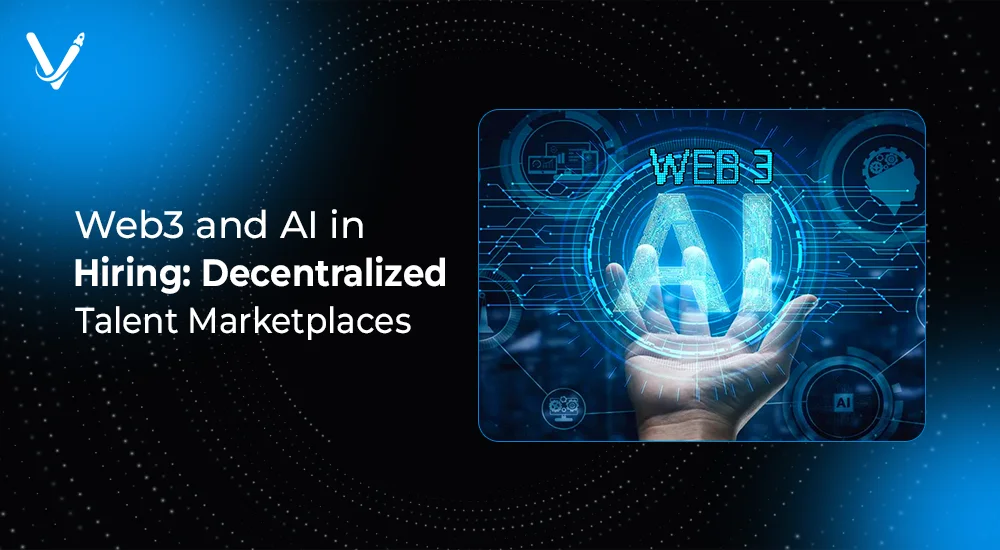Web3 and AI in Hiring: Decentralized Talent Marketplaces


- Aug 27, 2025
The world of hiring has always been shaped by technology. Job boards replaced newspaper classifieds, LinkedIn disrupted traditional networking, and AI-powered applicant tracking systems transformed how recruiters filter candidates. Yet, despite all this progress, hiring still faces challenges like biased decision-making, lengthy verification processes, and the dominance of centralized platforms that act as gatekeepers.
This is where the convergence of Web3 and AI comes into play. Decentralized talent marketplaces are emerging as a powerful alternative to conventional hiring models, offering transparency, fairness, and global accessibility. By leveraging blockchain’s trustless infrastructure and AI’s intelligent matching capabilities, these marketplaces could reshape how companies and candidates connect.
In this article, we will explore the fundamentals of decentralized hiring, how Web3 and AI intersect to power new talent ecosystems, the benefits and challenges of this model, real-world use cases, and what the future holds for organizations ready to adopt this transformation.
Before understanding the promise of decentralized talent marketplaces, it’s important to examine the existing pain points in recruitment. Traditional hiring is controlled by centralized platforms and agencies that profit by acting as intermediaries between companies and talent.
Centralized job platforms wield enormous power. They control data, charge significant fees, and prioritize employers or candidates who pay for visibility. This creates an uneven playing field where opportunities are filtered through profit-driven algorithms rather than fairness.
Recruiters spend weeks verifying candidate credentials, work history, and skills. Yet fraud remains common, and references can be manipulated. Trust is fragile in a system where verification relies heavily on manual checks.
AI is already part of traditional hiring, but poorly trained algorithms often reinforce biases instead of removing them. Combined with manual screening, this results in long hiring cycles and missed opportunities for both employers and job seekers.
Decentralized talent marketplaces are blockchain-based platforms where companies and candidates connect directly, without intermediaries controlling data or charging excessive fees. Instead of relying on centralized gatekeepers, these marketplaces distribute trust, reputation, and rewards across the network.
Web3, powered by blockchain, smart contracts, and decentralized identities, is at the heart of decentralized hiring platforms. It redefines trust and eliminates the inefficiencies of intermediaries.
In a Web3 hiring marketplace, candidates don’t just upload resumes—they own verifiable digital identities. Educational degrees, certifications, and work achievements can be issued as blockchain-based credentials, instantly verifiable by employers. This eliminates fraud while saving weeks of verification time.
Smart contracts ensure transparent and automated agreements between employers and candidates. Payment terms, project milestones, and conditions are encoded directly into the contract, ensuring both parties uphold their commitments.
Blockchain allows for token-based incentives. Candidates may earn tokens for completing projects, while employers can build on-chain reputations. A transparent reputation system ensures fairness and discourages manipulation.
While Web3 provides the infrastructure, AI brings intelligence to the marketplace. Artificial intelligence powers the matching, decision-making, and personalization that make decentralized hiring efficient and effective.
AI algorithms analyze skill sets, experience, and verified credentials to match candidates with roles that fit them best. Unlike traditional systems, these models are enhanced with on-chain trust signals, improving accuracy and fairness.
When properly designed, AI can reduce bias by focusing on verified skills and achievements rather than subjective factors. Open-source AI models can be audited, ensuring fairness and accountability in candidate selection.
Employers benefit from AI-driven insights into candidate performance predictions, cultural fit analysis, and workforce planning. Candidates gain feedback on skill gaps and recommendations for upskilling to remain competitive.
The true power of decentralized talent marketplaces emerges when Web3 and AI are combined. Together, they solve trust, efficiency, and fairness challenges in recruitment.
Imagine a world where a candidate’s blockchain-verified skills are instantly matched with a role by AI, while a smart contract automatically handles payment once milestones are achieved. This is not a futuristic vision—it is already becoming reality.
The integration of Web3 and AI offers numerous advantages for both companies and job seekers.
Despite its promise, decentralized hiring faces hurdles that must be addressed before it becomes mainstream.
Employment laws vary across jurisdictions, raising questions about how decentralized contracts and token-based payments align with existing labor regulations.
Mainstream recruiters and candidates may hesitate to adopt blockchain wallets, tokens, or verifiable credentials due to complexity and unfamiliarity.
While AI can reduce bias, poorly designed systems may amplify it. Ensuring fairness requires transparent, auditable AI models and governance frameworks.
Several projects are already experimenting with Web3 and AI in talent marketplaces, proving the concept is more than theoretical.
These early examples showcase the potential of decentralized hiring while highlighting areas for innovation.
The combination of decentralized infrastructure and intelligent automation points toward a radically different hiring landscape. Over the next decade, we can expect decentralized talent marketplaces to become more user-friendly, interoperable across industries, and integrated into mainstream corporate hiring systems.
Employers will access global, verified talent pools within seconds. Candidates will control their career identities and interact with employers without bias or gatekeepers. Smart contracts will handle everything from salary agreements to dispute resolution. AI will continuously improve matching, making hiring faster, cheaper, and more accurate.
The future is not about replacing recruiters but empowering them with decentralized and intelligent tools to build fairer, more transparent job markets.
Web3 and AI are reshaping how we think about hiring. By enabling decentralized talent marketplaces, they address the long-standing inefficiencies, biases, and trust issues of traditional recruitment systems. Blockchain ensures transparency and data ownership, while AI enhances efficiency and fairness in matching. Together, they create an ecosystem where opportunities are open, trustworthy, and globally accessible.
At Vasundhara Infotech, we help organizations explore and implement cutting-edge blockchain and AI solutions tailored to the future of work. If you’re ready to embrace decentralized hiring platforms or integrate AI into your recruitment processes, our team can guide you through building scalable, secure, and innovative solutions.
Copyright © 2026 Vasundhara Infotech. All Rights Reserved.
